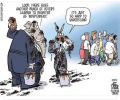It's easy to understand how a 3rd party would sprout under these circumstances, and it's only logical to consider the track record of 3rd parties of the past. The most recent was Ross Perot and the Reform Party, which was primarily a grassroots movement.
I was intensely involved in Perot '92. In July of that year, he lead Bush and Clinton in the polls. Then his ego got the best of him and he crashed and burned. But I will never forget the sight and emotions and energy of the millions of people, independents, Republicans and Democrats alike, who spontaneously rose up to say yes to something new and no to the other two.
At this point, the Forward Party is different. There is no presidential campaign underway (at least not out in the open) and no candidate to be the Party's face. For now, the people rising up (by the thousands in just two days) are rising to do the grass roots work needed to win in later years.
The Reform Party was an attempt to organize a national party out of the Perot campaign wreckage. It did not succeed for a variety of reasons. The Forward Party people are fond of saying this is a different time and they are absolutely correct. In Perot's day, the internet was dial-up, cell phones were cinder-block size, fax was hi-tech, and social media was barely a thought. Now, everyone has a phone on them and you can reach millions instantly.
Additionally, the Forward Party is the combination of three predecessor entities, all of which bring multi-state and high caliber leadership to the table. Back in 1992, Reform Part leadership was a fragmented mess of people who knew little of the political game. The steering committee leadership at the Forward Party national level and several states are amazing. They are former Republicans and Democrats who used to play large in their respective parties. They know the game and play it well.


 www.yahoo.com
www.yahoo.com


